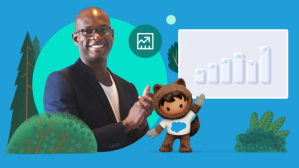American Psychological Association, ineffective multitasking can cost up to 40% in productivity. Put simply, productive salespeople are more successful, delivering bigger deals, and driving demonstrable business growth.
At Salesforce, we define sales productivity as the result of a combination of sales efficiency and sales effectiveness.
Sales efficiency is about maximizing the amount of productive time that your sales team has available in a day, eliminating low-value activities, and creating space for high-value activities. A simple measure of increased sales efficiency is how many additional prospecting calls are being made each day.
Sales effectiveness is all about how those additional calls are used and what they deliver. An effective salesperson might translate 50% of those additional calls into qualified opportunities, while someone less effective may only convert 20% or less.
So, if sales productivity is sales efficiency plus sales effectiveness, then the key is integrating both effectiveness and efficiency with the right tactics to ensure maximum productivity. Some of the most impactful tactics focus on prioritization, maximising sales engagement tools, and effective automation, all through the lens of a unified system.
Here, we share five strategies that are delivering measurable improvements in sales productivity for our customers from small local businesses to global enterprises.
Sales Cloud
Grow with ease, from anywhere, with the right sales tools. Bring out the best in every rep. Win more deals as a team. And strengthen customer relationships with Sales Cloud, now with Slack.

1. Prioritize activities that deliver the highest impact
Effective prioritization is a big driver of success, but prospect prioritization can be extremely difficult. It can be tough to identify whether a deal is a high or low value and salespeople may not have the time to access the information they need to make the correct appraisal.
Now, new AI capabilities can guide salespeople and their managers through that process, helping highlight the opportunities that really matter. These sophisticated systems can unify customer data across a multitude of departments, gain a holistic 360-view of customers, predict which prospects are most likely to close and unpick insights that drive a company’s business strategies.
At Salesforce, Sales Cloud Einstein analyses CRM data and applies algorithms based on prospect conversion trends and recent engagements to automatically prioritize the most promising opportunities, as well as the deals needing the closest attention.
Numatic Iberia, a subsidy of the UK’s largest commercial cleaning equipment manufacturer, harnesses the power of AI to keep its pipeline healthy, using Sales Cloud Einstein to score up to 500 opportunities, generating alerts to prompt the actions that lead to conversions.
“Salespeople earn a commission, so it can be tempting for them to go for low-hanging fruit rather than the longer, more valuable wins. With Sales Cloud Einstein, we can make sure we focus on the best opportunities without the team feeling like we’re breathing down their necks.” Nuno Barata, CEO, Numatic Iberia

2. Maximize every sales team member’s potential
Today, the coaching and training of sales staff can be data-driven and personalized to meet the needs and ambitions of each individual and to maximize their value to the team.
With modern sales engagement tools, managers can access insights and analytics at a forensic level, providing extensive visibility into sales performance, identifying areas for improvement, and maximizing return on investment in sales training.
Dublin-based Immedis is the world’s fastest-growing global payroll technology company. To manage its sales process, it implemented Salesforce Sales Engagement, coordinating diaries and accounts, empowering salespeople to make the right move at the right time, maximizing their productivity, and boosting job satisfaction.
“We can be talking to many stakeholders on each account, so managing those points of contact becomes very important. With Salesforce Sales Engagement, we have that level of accountability and transparency now, we can see performance and metrics, for example, which sales cadences or email templates are more effective than others.” Amy McDermott, Revenue Operations Director, Immedis

3. Automate, automate, automate
Automation is transforming the efficiency of sales teams, cutting out low-value, repetitive tasks and empowering them to focus on selling and less on administrative work. Today’s intuitive, connected, and integrated sales systems provide everything salespeople need – prioritised task lists, prompts, insights, and trends – to maximise sales productivity.
One of the UK’s leading recruitment companies, BMS Performance, deployed Salesforce Sales Engagement to cope with the impacts of COVID-19 and the instant requirement for remote working. With all the tools and resources in one place, it has the perfect platform to manage its selling strategies and deliver results to its clients.
“Previously, it would have been impossible for managers to provide the right level of support to someone working remotely. Now, with Salesforce Sales Engagement, where someone is located has become irrelevant. We have everything at our disposal to make sure that everyone is on-message, using the right content, with everything captured in Salesforce.” Ben Illingworth, Sales Director, BMS Performance

4. Collaborate and share data via a single source of truth
Having a single source of truth for sales teams and their leaders makes collaboration and driving sales productivity a whole lot easier. Reducing the need to toggle between systems and having to sift through mounds of data can be time-consuming and can ultimately distract you from the task of hand-selling.
A unified system maximizes your chances of providing the best customer experience. With a detailed understanding of each customer, including the stage and health of each deal, can ensure you create the most personal and relevant customer experience possible.
French sustainable energy giant Schneider Electric had these exact problems before adopting Sales Cloud. In less than two years, Schneider Electric’s 30,000 employees went from dealing with many complex systems to one single source of the truth. This helped enhance their sales and service performance worldwide and they haven’t looked back since.
“Salesforce has completely transformed the way we manage our customer base, we now have one version of the truth to rally the company behind.” Chris Leong, Chief Marketing Officer, Schneider Electric

5. Know what your customers really want
Understanding customer needs is one of the most important steps when trying to get a deal over the line. With rich, customer-related data now available, salespeople can appreciate in more detail the challenges their customers face, anticipate their problems, and make informed and timely proposals of how their business can help.
By enabling the right conversations at the right moments, and demonstrating empathy built on accurate information and insights, today’s most productive sales teams build a pipeline of opportunities that can deliver revenue growth and increased value for their customers.
Emerging technology company, GoCardless was having issues with tracking sales stages and understanding what deals to focus on. GoCardless chose Salesforce as their customer experience platform and since then they have seen their 47 employees conduct up to around 18,000 calls and emails with prospective customers, more than double the activity levels for the same period in the previous year.
“We can slice and dice opportunities in so many different ways – industry vertical, country, sales rep. We can also see what deals are about to close, which gives us a better idea of what is happening in the market.” Simon Gilks, Director of Global Sales Operations and Enablement, GoCardless.

Learn more about Sales Cloud with the video below.
E-Book: How to Sell
Let this guide be your roadmap taking you through the fundamentals of selling, putting you on the path to closing deals and growing revenue.

























